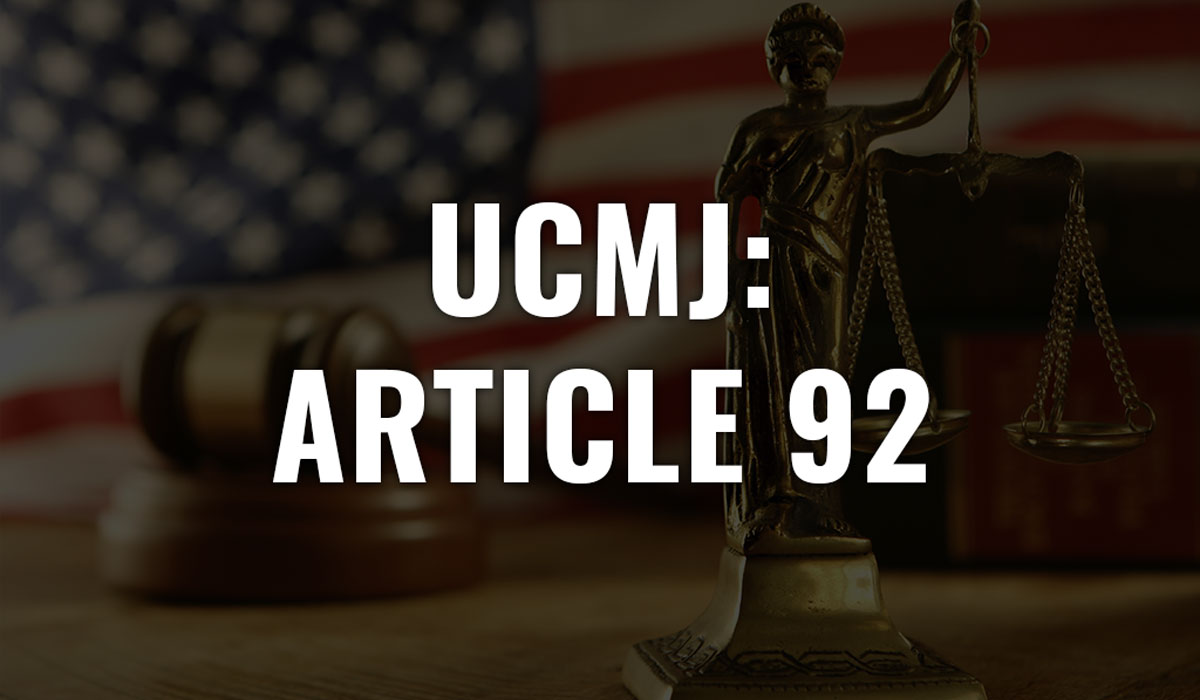Military life operates under a rulebook, and the ultimate guide for military conduct is the UCMJ. It covers an array of offences and legal procedures applicable to all branches and members of the U.S. military, no matter where they’re stationed. Stepping out of line comes with consequences.
Within the UCMJ is a disciplinary provision laying down the consequences for not following orders and regulations (Article 92). In Article 92, failure to obey an order is a serious offense that could result in disciplinary action. It can be a violation related to disobedience, insubordination, or various breaches of military discipline.
Within the military legal system are military lawyers; among their key roles is providing defense services for service members facing serious charges, and Article 92 is just one of them. It’s a fundamental right—if a service member is facing court-martial, they have the right to legal representation.
From the elements that constitute this article to the potential consequences for violating it, we will discuss Article 92 under the UCMJ.
Elements of Article 92
Article 92 of the Uniform Code of Military Justice covers the offence of failure to obey an order or regulation. It outlines the specific elements that must be met for a service member to be charged and found guilty of this offence. The elements of Article 92 typically include:
- There must be a lawful order or regulation in place. This means that the order or regulation must come from a competent authority and be within their jurisdiction. Not all orders are lawful, and service members have the right to question the legality of an order before following it.
- The accused must have known the order or regulation. This means that the service member must have been aware of the existence of the order or regulation and understood what it required of them. Ignorance of an order isn’t a valid defence.
- The accused must have willfully disobeyed the order or regulation. Willful disobedience means the service member intentionally and knowingly chose not to follow the order or regulation.
Every service member must always be aware of the orders and regulations that apply to your position and to seek clarification if there’s any doubt.
Types of Orders and Regulations
As a service member, you’re bound by various orders and regulations that govern your conduct and actions. These orders and regulations come from different sources, such as military commanders, unit regulations, service branch policies, and the Uniform Code of Military Justice (UCMJ).
- General Orders: These are basic and fundamental instructions that apply to all service members. They outline your responsibilities and expectations, such as standing watch, reporting crimes, and maintaining discipline.
- Special Orders: These are specific instructions given to individuals or groups for a particular purpose. These orders can include assignments, deployments, training requirements, or temporary duty assignments.
- Regulations and Policies: It provides guidance on a wide range of topics, including appearance and grooming standards, fraternization, equal opportunity, and drug and alcohol use. These regulations are designed to ensure uniformity, discipline, and the overall effectiveness of the military.
- The UCMJ: It is a comprehensive set of laws that govern military conduct. It outlines offences, punishments, and procedures for military justice. Violating any of these orders and regulations can result in disciplinary action, such as administrative punishment or even court-martial.
Consequences for Violating Article 92
Violating Article 92 of the UCMJ can result in significant consequences for service members. The severity of the consequences depends on various factors, such as the nature and extent of the violation, the individual’s rank, and the impact on military discipline and order. Here are some of the consequences:
- Disciplinary Action: This can range from a verbal or written reprimand to more serious punishments such as extra duty, reduction in rank, or forfeiture of pay. A court-martial may be convened in more severe cases, leading to potential imprisonment, dishonourable discharge, or even the death penalty for particularly egregious offences.
- Long-Term Consequences: Violating Article 92 can tarnish a service member’s reputation and harm their military career. It can hinder promotions, limit future job opportunities, and even result in the loss of certain benefits and privileges.
A violation of Article 92 can also have legal implications outside of the military. Depending on the nature of the offence, it may be subject to prosecution under civilian law, leading to additional penalties or charges.
Defences Against Article 92 Charges
You can mount a defence when facing charges under Article 92 of the Uniform Code of Military Justice (UCMJ). While each case is unique and defence strategies will vary, some common defences can be used to challenge Article 92 charges.
- Lack of knowledge: It may be a valid defence if you can demonstrate that you were unaware of the specific order or regulation you allegedly violated. This defence might not be successful if you were reasonably expected to know the order or regulation.
- Necessity: If you can prove that you had no other choice but to violate the order to prevent greater harm, this defence may be applicable. You will need to show that the harm you sought to prevent was imminent and greater than the harm caused by the violation.
- Mistake of Fact: This can also serve as a defence. If you can demonstrate that you made an honest and reasonable mistake about the facts surrounding the order or regulation, it may help your case. This defence might not be available if you were negligent or reckless.
You can consult with a military lawyer who specializes in UCMJ cases to determine the best defence strategy for your specific situation. They can help you navigate the complexities of the military justice system and ensure that your rights are preserved under military law.
How Article 92 Is Enforced in the Military Justice System
Enforcement of Article 92 in the Military Justice System involves the strict application of rules and regulations to ensure discipline and accountability among service members. When an individual violates Article 92, they may face disciplinary action, including a range of punishments such as reprimands, reduction in rank, forfeiture of pay, extra duties, or even imprisonment.
- Chain of Command: Each level of command is responsible for maintaining order and discipline within their unit. Commanders are authorized to act appropriately against any service member who disobeys orders or regulations. They can initiate investigations, prefer charges, and convene court-martial proceedings.
- Military Police and Other Law Enforcement: They can investigate alleged violations and gather evidence. Upon completing their investigation, they submit their findings to the appropriate commander for further action.
The enforcement of Article 92 isn’t taken lightly in the military justice system. The goal is to maintain discipline and uphold the values of the military.
Conclusion
Article 92 of the UCMJ outlines the importance of following orders and regulations in the military. It specifies the consequences for violating these orders and provides possible defences against Article 92 charges.
Violations of Article 92 can lead to disciplinary action and potentially impact a service member’s career. Enforcing Article 92 within the military justice system preserves discipline and the armed forces’ operational efficiency.

















